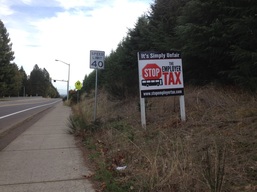 This November, Salem-Keizer residents will be voting on a ballot measure to fund improvements to the Salem-Keizer Transit system (Cherriots) Since transit-related issues figure prominently into my business model and ethos I would like to contribute my thoughts. The local Chamber of Commerce has organized opposition to the ballot measure under the slogan, “It's Simply Unfair, Stop the Employer Tax.” So what is the transit bill and what would constitute a fair approach to funding mass transit? Ballot Measure 24-388 would levy a payroll tax of 0.21% on area businesses, raising an estimated $5 million per year, in order to add weekend and holiday service, later evening service and a student bus pass program (1). The tax applies to most employers; notable exceptions include the State of Oregon, Salem-Keizer School District, and most 501(c)(3) organizations (non-profits). In order to calculate the tax for a given business multiply gross payroll by 0.0021. For example, if an employee grosses $40,000 then the employer will pay a tax of 0.0021 x 40,000 = $84 for that employee annually. According to Cherriots, the median payroll tax in the transit district would be $169 per year. By comparison, TriMet (Portland) levies a payroll tax of 0.7137% and Lane Transit District (Eugene) sets it at 0.69% (2). Current funding for Cherriots comes from bus fares, property taxes, and state and federal contributions (3). How do we evaluate fairness when it comes to funding a mass transit system? The most obvious philosophy would state that each person should pay the full cost of the service they receive. In other words, mass transit should be funded entirely from fares paid by actual riders. How is it fair for me, as a taxpayer, to subsidize a bus ride for someone else, when I am already funding my own transportation (via bicycle or automobile)? It's NOT fair...unless we acknowledge that there's a public benefit to mass transit. There are many ways in which we pool our dollars (via taxes) to provide public benefits that may not directly affect us. For example, even though my wife and I have no children of our own, we still pay property taxes that fund local schools. In a way it feels like we're donating money to other people's children, yet we know that we prefer living in a neighborhood where all children and teens receive a good education, surrounded by good adult role-models. The alternative would surely lead to a reduced quality of life for me and my wife. Similarly, we fund public health care programs (admittedly, not without controversy) because even when I pay for my own health care, I still benefit from a society in which everyone has their basic needs covered. I would suffer a reduced quality of life were I surrounded by sick and desperate neighbors. Does mass transit meet the standard of a “public benefit?” According to AAA, the average annual cost of car ownership is $9,122 (4), which is out of reach for many of our neighbors (a Cherriots annual pass costs $540). Furthermore, many citizens may be excluded from car usage for other reasons such as age or disability. In order to evaluate the fairness of a transit tax, we must ask if we accrue a benefit from guaranteeing reliable transportation for these neighbors? Business owners, especially, must consider the benefit of mass transit for helping employees get to work and of freeing up customer parking spaces in otherwise congested areas. Other potential public benefits of mass transit to consider include reduced greenhouse gas emissions and reduced traffic. If we were to establish that mass transit provides a public benefit even to those who don't utilize the system, we would still need to ask whether a payroll tax is fair to area businesses. Opponents to the measure state that it's unfair to exclude the State of Oregon from the tax and also that small businesses can't handle one more tax (5). Of course, Cherriots already receives state and federal funding and since the state is funded through our own tax dollars, to levy a payroll tax on the State of Oregon would be a roundabout way of taxing ourselves. We already support Cherriots through portions of our property taxes and state income taxes. Would an annual tax of $169 (for the median employer) have a meaningful effect on small businesses? We've already seen that the proposed payroll tax for Salem-Keizer is less than one-third the rate of Portland and Eugene's transit districts, where businesses appear to be thriving. Consider my own business: I currently do not have any employees, so the payroll tax would not affect me, however, I anticipate growing my business and hiring employees in the coming years. As I watch my business grow, I know that adding employees will be a sign of success and that my profits will increase as I expand in scale and efficiency. Even at current profit levels (which I presume to be lower than more established businesses), I would not consider a couple hundred dollars to be a great burden. I am an occasional rider of our local transit system. Every time I ride, it is obvious that I am among a less-advantaged segment of our population. Teens, single moms, elderly, and people with disabilities are the typical folks who I see on the bus. Personally, I would like to see their transportation needs taken care of. In the next few weeks, I encourage you to take the time to ride on Cherriots and meet the people who depend on it. Then consider what reliable public transit is worth to you. I know that we all fare better when we each do our part for the public good. I hope that you'll get informed and vote on what fairness means to you this November! -Joseph Penner (1) http://www.cherriots.org/en/ballotmeasure (2) http://www.oregon.gov/DOR/BUS/pages/faq-transit.aspx (3) http://cherriots.org/sites/default/files/2015%20Adopted%20Budget%20Document_0.pdf (4) http://newsroom.aaa.com/2013/04/cost-of-owning-and-operating-vehicle-in-u-s-increases-nearly-two-percent-according-to-aaas-2013-your-driving-costs-study/ (5) http://www.stopemployertax.com/
14 Comments
|
|


